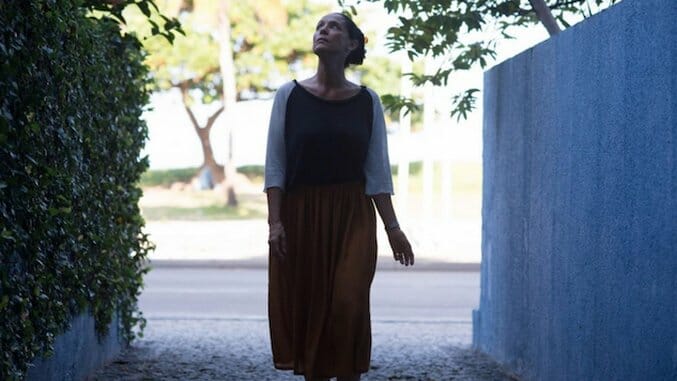
Brazilian director Kleber Mendonca Filho has made only two features, but with his second, Aquarius—which premiered at this year’s Cannes Film Festival to well-deserved acclaim—he achieves artistic heights common only to the masters of the medium: Jean Renoir, Yasujiro Ozu, Ingmar Bergman, Abbas Kiarostami, Richard Linklater. Like those directors, Filho has distilled the essence of what he’s trying to say into the clearest, most direct form of expression possible. Yet rather than simplify, this straightforward approach allows him to explore existence in all its complexity, with images as layered as they are concise. His premise serves as a jumping-off point for profound and moving explorations of memory and identity.
Aquarius follows Clara (Sonia Braga), a widow and retired music critic who is the last holdout in an apartment building marked for destruction. The real estate developers who have plans for the building make Clara a generous offer, but she doesn’t want to move—the memories and totems that comprise her life are inextricably linked to the place in which she lives, and to her these intangible things are worth far more than any material goods or cash that she can exchange them for. (She’s also, to be fair, a little on the stubborn side.) As the movie progresses Clara digs in her heels, and everyone around her—not just the development company but members of her own family and ex-neighbors whose own fortunes are being held up by her recalcitrance—steadily increases the pressure on her to sell.
As this happens, Filho ratchets up the dramatic intensity subtly but powerfully, conveying the significance of Clara’s emotional investment in her property so clearly that the movie takes on the suspenseful characteristics of a great thriller. He also uses her tale as a microcosm for the seismic shifts in Brazilian society as a whole, examining conflicts between history and the arts and the crass demands of the marketplace, yet he does this in such an integrated way that the movie never feels preachy or didactic. The assault on Clara becomes an assault on memory and experience and culture and beauty, and, in its own way, it’s every bit as violent as The Texas Chainsaw Massacre, a film Filho has acknowledged as an unlikely influence.
By the movie’s climax, one woman’s struggle to hold on to her apartment takes on a dramatic weight found in the most ambitious, large-scale epics—yet Filho’s touch couldn’t be lighter. His direction is elegant and restrained, because he has the confidence not to force his effects. He believes in his ideas, and knows they’ll deepen and expand in the viewer’s mind if he just presents them unadorned. Undoubtedly, part of his confidence comes from the gift he got from Braga, who gives not only the performance of her career but one of the greatest performances by any actress in any movie, ever. She does the same thing with her voice, face and body that Filho does with his camera, finding economical gestures that express infinite emotions and ideas. I can’t think of many other roles that so fully encapsulate the human condition in all its humor, tragedy, loss, triumph, eroticism, weariness, fear and hope. Clara is one of the great heroines in contemporary cinema, and her story is one that will endure.
Director: Kleber Mendonca Filho
Writer: Kleber Mendonca Filho
Starring: Sonia Braga, Maeve Jinkings, Humberto Carrao, Irandhir Santos, Julia Bernat
Release Date: Oct. 14, 2016
Jim Hemphill is the writer and director of the award-winning film The Trouble with the Truth, starring Lea Thompson and John Shea. He has written about movies for Filmmaker Magazine, Film Comment, and many other publications. You can follow him on Twitter.